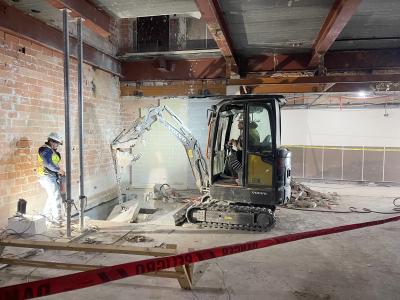Since the first of the year, Palmetto Paving has been trying to push forward with a road-widening project in Florence, SC. Unfortunately, Mother Nature has been pushing back. “It’s been the wettest winter in 10 years,” chuckled Project Manager Carl Rabon. “With so much drought in recent years, people forget what a real winter is like.”
“Our only holdup on this project has been the weather,” lamented Tige Howie, Palmetto’s self-proclaimed “hand-shaker” in charge of overseeing aspects of the project ranging from purchase orders and suppliers to vendors and media. “There has been a tremendous amount of rain. It wasn’t until the first week of April that we really got a good run. The area is so wet and swampy that one day of rain translates into an extra day to dry.”
In spite of the weather, Howie noted that Palmetto is still on target for its September 2004 completion date of the $5.5-million job to widen a 2.96-mi. (4.7 km) portion of Hoffmeyer Road in Florence. Let by the South Carolina Department of Transportation (SCDOT), the project falls under the state’s “accelerated construction project” fallout fund. By incorporating innovative financing techniques, the state improved its last-place position in line for federal funds and received $5 billion for road construction projects. The result is an attempt to compress 27 years of backlogged projects into seven years of completion.
Hoffmeyer Road winds through an upscale residential area graced by homes ranging in price from $200,000 to $500,000, is crossed by Interstate 95 (which also is undergoing widening near Florence), and empties into a busy commercial zone. In an attempt to ease congestion in the bustling residential neighborhood, Palmetto’s goal is to widen the roadway to five lanes, with curbs, gutters and sidewalks throughout. In addition, the entrances to the residential subdivisions will be widened to include two exit lanes with one entrance lane. Palmetto also is replacing three existing traffic signals and installing an additional one at Dumbarton Street.
Congestion remains “un-dissipated,” and has been an issue during construction. “There are a lot of traffic issues along Hoffmeyer,” said Howie. “There are a lot of secondary incoming roads. There’s a tremendous amount of traffic, and our crews have witnessed several accidents.” There also have been a lot of complaints from residents, added Rabon. To console inconvenienced commuters, Palmetto notifies the media two weeks in advance of required road closures, which it tries to keep to a minimum.
To further reduce the company’s contribution to the congestion — and to keep crews safe — Palmetto has employed safety measures such as barrels, cones and flaggers. All crews wear orange vests, and are kept 15 feet off the roadside as much as possible. Howie explained that crews are kept away from the road during rush hours, but in spite of that, Palmetto is trying to stick to a five-day-a-week schedule: one shift from sun-up to sun-down, with as many as 40 people on the job site at one time.
“Most of our total work force [of 110 employees] is here,” said Howie. “We’re working four other contracts in the Florence area, so we’re spread a little thin. But we’re concentrating here because it’s a bigger job and, quite frankly, it’s getting more publicity. We’re relatively new to Florence — we put a second plant here three or four years ago — and we want to establish a solid reputation here.” The new branch enables Palmetto to do the complete job, Howie noted. Although the company has employed subs for the concrete, pipe and milling work, Palmetto is completing most of this contract in-house.
The family business was established in the Myrtle Beach area three generations ago. Founded on private work consisting mostly of asphalt resurfacing, under President Marshall Godwin and Vice President Shawn Godwin, the company quadrupled in size last year and began going after larger projects. Rabon, a 27-year employee, said the Hoffmeyer Road project is the largest logistical project the company has taken on. “The DOT is watching us pretty closely,” he added.
What they’re watching is a lot of action. Rabon estimates 88,000 tons (79,832 t) of unclassified excavation, 84,000 tons (76,204 t) of material brought in for the project — in addition to 55,000 sq. yds. (45,987 sq ft) of cement stabilized base for the sub base and 25,000 tons (22,680 t) of asphalt.
To move that much material, Palmetto is using two Cat D5s, a Cat 330 track hoe, a Komatsu PC300, a Komatsu PC220, a Komatsu PC200 and three dozers. Some of the equipment was recently purchased from Mitchell Distributing — in part, Howie explained, because the new branch in Florence requires the addition of more equipment, but also because it’s “more efficient. New equipment doesn’t break down as often.”
It does get stuck, though. Howie recalled a particularly wet day when even their track hoes couldn’t forge ahead. “We’re extending a box culvert,” he recounted, “and it was so wet, a track hoe got stuck. It’s extremely hard to do any work when there’s water coming in the cab.”
Rabon said crews have been waiting three months to start work on a 35-ft. (11 m) extension to an existing box culvert. In addition to torrential rains, the area is impacted by about eight beaver dams, resulting in prohibitively high water. “We’re working with the DOT to trap the beavers and remove the dams,” commented Rabon. “Until that’s resolved, we can’t start work in high water like that — new equipment or not.”
Mitchell sales rep Earl Persons, who has been doing business with Palmetto for “years and years and years — as far back as the ’80s, when we did business with the current owner’s daddy,” said his dealership does very little maintenance on Palmetto’s equipment. “They have as many mechanics in the field as we do,” he claimed, “so they do their own oil changes and routine maintenance. We haven’t been called to do any major repairs on any equipment on this project.”
Although Palmetto owns several dump trucks, Howie said the company did have to lease several additional trucks and hire subs for hauling the enormous amounts of dirt required on this project. “The land there is flat,” he noted, “so we’re moving a lot of dirt. We’ve got four hoes on this job, and three pits — one close to the project and the other two within eight miles. There’s a lot of hauling work in Florence; trucks are at a premium around here.”
Lori Lovely
Lori Lovely is an award-winning journalist, editor and author of the children's book Isadora's Dance. She has worked for newspapers, magazines and niche publications, covering a wide-ranging list of topics that includes motor sports, construction, MSW, energy, environmental issues, water, animal rights and issues, history, Native American issues and people, real estate and home decor, farming and more. Her degrees in History taught this dedicated professional to research thoroughly and ask detailed questions in order to winnow interesting facts that convey the essence of the story. As a seasoned writer and compassionate storyteller, she accurately portrays the subject in a manner that entrances the reader.
When she's not working on assignment, Lori is tending to her historic Indiana farm, where she raises alpacas. An inveterate animal lover, this vegetarian enjoys spending time with her animals and working in her garden.
Read more from Lori Lovely here.
Today's top stories










